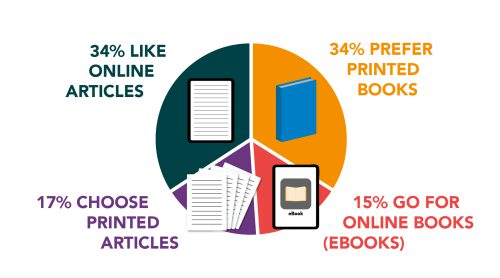The moment TV was invented, everybody thought it would mean the death of radio. That didn’t happen, though; instead consumer habits changed and adapted. After a while, one could identify a behavioral trend with the introduction of every new media: first an unsubstantiated fear and then the adaption after the initial surge. What does that mean for printed media such as books, journals, and research papers?
The point of research is to present the newest findings in a field and also, hopefully, to sometimes revolutionize the field. To write a research paper, the author needs to find literature to support new scientific findings. We may remember from our days at the university how intensive the writing of even seminar papers could be, imagine writing a research paper!
During my university time, thankfully, I could already find and use online resources, but many decades ago, one had to go to the library and physically flip through books to find what one was looking for. Some scholars even had to travel to libraries in another country because the one book that they were looking for was only available there. This was a very time-intensive process.
Are Only Printed Books the Real Deal?
However, even nowadays, in a very digital time and age, some still prefer the “old-fashioned” method. But why is that so, you might ask? The smell of books cannot be replaced by an e-book, and it’s harder (but not impossible) to add your notes or highlight important sections in a digital text. My mom, for instance, reads more books than anyone I know. I wanted to gift her with an e-reader many times, but she could not be convinced. “I like the smell and feel of books, it reminds me of a happy, uncomplicated time. Scrolling onscreen takes away the magic,” she says. So, I was curious to find out what readers of scientific content prefer when it comes to reading books and articles, printed or online. The infographic below showcases the results of a poll we published on our social media channels.

We can see that print is far from being extinct, but also that online resources are (just as) important. The main issue with physical books is that they are not as up to date as online articles, a physical book (or article) cannot be shared that easily, and you have to physically pack it in your bag, since it’s not automatically in your cloud or on your server. Books are relevant for general theories that withstood the test of time, digitalization, and other factors, but the findings and developments in a field are more likely to be found in recently published online articles.
Even though at Karger, most publications are articles, books and book series had a very significant role decades ago and some are still relevant nowadays. Most of the books are available on- and offline, and some of them are free access and downloadable as a pdf or an e-book file (check out our Fast Facts for patients or clinicians)
With the rising importance of Open Access and Open Science , we turned our focus more and more to online publications, videos, podcasts and other digital channels. Stay tuned for many exciting things that are coming soon!






Comments
Share your opinion with us and leave a comment below!